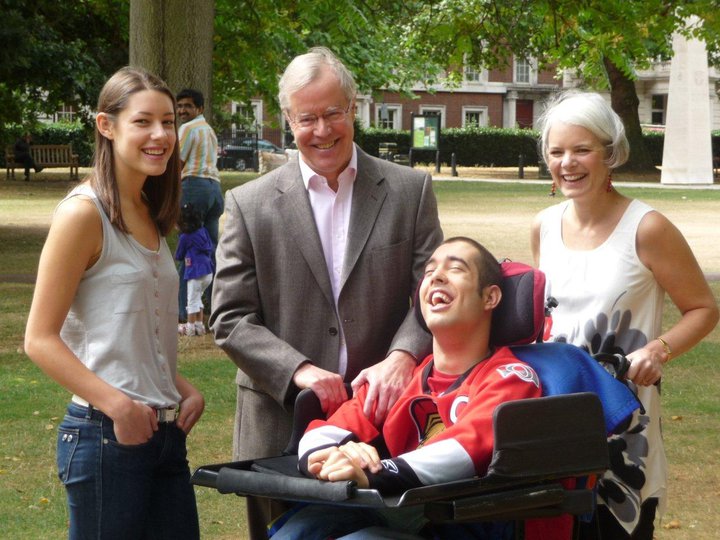Al Etmanski is Canada's godfather of social finance, social enterprise and innovation, especially in the realm of social care. As if he doesn't do enough for our country every day, each year at about this time, Al asks a number of his colleagues to reflect on a question. Last year, we all wrote about a trend or phenomenon we would like to see made more visible in 2011. This year, Al usurped a metaphor from Wayne Gretzky, our national ice hockey hero (who could always predict where the puck would be on the ice) and asked, "This year, what are you skating towards?" Here is my offering. I encourage everyone to subscribe to Al's blog and to read the full complement of responses to Al's question for 2012. They will be available to read early in the New Year.
In November of this year, Louise Kinross, the editor of "BLOOM”, the Holland Bloorview family magazine, attended a conference on medical ethics and disability at McGill. She reported that one neonatologist commented “There is a feeling among my colleagues – an unspoken and probably unconscious bias – between physical and mental disability. Sometimes neonatologists think if you're not perfect mentally, you're better off dead. But when it comes to physical disability, they will go a long way with interventions.” But also described at the McGill seminar was “The Disability Paradox” - that people with serious disabilities rate their lives as good or excellent while able-bodied people, particularly medical professionals, rate quality of life in people with disabilities as poor.What are you skating towards? Frankly, I have no idea. I am careening and I can’t quite see where the winds of change are taking me. Within the last four months, we have moved our family across the world, my husband retired from the diplomatic corps after thirty-seven years, and we helped our adult son relocate from the family home into a residence with nursing care. In my book and my blogs, I write about disability, care in the community and our aging population. Lucky that I have such rich material within my own four walls!
During the past few months, I described to a friend how I felt about the onslaught of change in my life - “it’s as if someone has removed all the floorboards from my house”, I said. “It’s like I am walking on just the narrow joists and all the time, I worry about falling”.
I know that others will write here about skating towards positive change, and I will be inspired. But I would like to talk about ‘defense’ and not ‘offense’, to use another hockey metaphor. A great defensive player also knows where the puck will be in order to stop a goal by the opposing team.
Over the last year, I have observed a pernicious trend, and in 2012, I will be skating defensively toward it. Thanks to information technology, I have many friends all over the world who are also parents of children with disabilities. One family, from Australia, I have known ‘virtually’ for many years - their son has developmental disabilities, is medically complex and has managed to survive over 77 hospitalizations in his 23 years of life. This year, the professional advisory committee at their hospital took a unilateral decision that there would be no more ICU hospitalizations or resuscitation measures because these would ‘not be in the best interest of the patient’ and furthermore, they would be ‘futile’. It was my guess that a meeting of hospital administrators had taken place that basically placed a cap on the public funds that one individual could or should consume in a lifetime - especially if that individual had development disabilities. This is a story that I am hearing more and more from families the world over.
The elderly, especially those with dementia, are also in a risky situation. In the absence of a strong and vocal personal support network, those who are vulnerable and voiceless risk becoming expendable, especially in a climate of austerity. And I believe that negative attitudes toward those who are not employed or employable are growing.
The worth of giving and receiving care is my ‘defensive’ strategy. I believe that in Canada, we urgently need a public conversation about a national ethic of care. We need to pick apart the human value of those individuals with care needs and who will pay for their wellbeing. The moral, political and financial responsibilities of care must be delineated for the individual, the family and all levels of government. We must nurture and enable innovation and sustainable business models to operate in this sphere and we must do it now.
My hair is white and my son requires 24 hour nursing care. My mother turns 90 this year. Scratch the surface of Canadian society - my family is not that unusual. Careening toward the future is not a good way to score goals and win the game OR make public policy. We need an honest and public appraisal of our strengths and capabilities in the arena.
In my family, we rate our life as excellent. I want to make sure that we keep it that way, so in 2012 I'll be keeping my eye on the puck and designing my next defensive strategy.

No comments:
Post a Comment